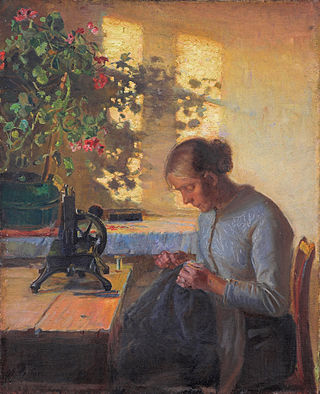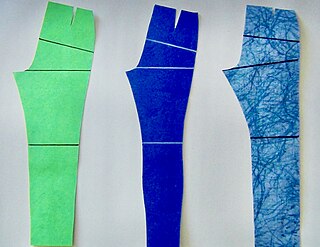
Singer Corporation is an American manufacturer of consumer sewing machines, first established as I. M. Singer & Co. in 1851 by Isaac M. Singer with New York lawyer Edward C. Clark. Best known for its sewing machines, it was renamed Singer Manufacturing Company in 1865, then the Singer Company in 1963. It is based in La Vergne, Tennessee, near Nashville. Its first large factory for mass production was built in 1863 in Elizabeth, New Jersey.

Linen is a textile made from the fibers of the flax plant.

A sewing machine is a machine used to sew fabric and materials together with thread. Sewing machines were invented during the first Industrial Revolution to decrease the amount of manual sewing work performed in clothing companies. Since the invention of the first sewing machine, generally considered to have been the work of Englishman Thomas Saint in 1790, the sewing machine has greatly improved the efficiency and productivity of the clothing industry.

Sewing is the craft of fastening or attaching objects using stitches made with a sewing needle and thread. Sewing is one of the oldest of the textile arts, arising in the Paleolithic era. Before the invention of spinning yarn or weaving fabric, archaeologists believe Stone Age people across Europe and Asia sewed fur and leather clothing using bone, antler or ivory sewing-needles and "thread" made of various animal body parts including sinew, catgut, and veins.

Brother Industries, Ltd. (stylized in lowercase) is a Japanese multinational electronics and electrical equipment company headquartered in Nagoya, Japan. Its products include printers, multifunction printers, desktop computers, consumer and industrial sewing machines, large machine tools, label printers, typewriters, fax machines, and other computer-related electronics. Brother distributes its products both under its own name and under OEM agreements with other companies.

The textile industry is primarily concerned with the design, production and distribution of textiles: yarn, cloth and clothing. The raw material may be natural, or synthetic using products of the chemical industry.

In sewing and fashion design, a pattern is the template from which the parts of a garment are traced onto woven or knitted fabrics before being cut out and assembled. Patterns are usually made of paper, and are sometimes made of sturdier materials like paperboard or cardboard if they need to be more robust to withstand repeated use. The process of making or cutting patterns is sometimes compounded to the one-word Patternmaking, but it can also be written pattern(-)making or pattern cutting.

Alpha Industries is an American clothing manufacturer founded in 1959 in Knoxville, Tennessee. Alpha Industries specializes in American military style and fashion apparel items such as flight jackets. It has produced the M65 Jacket for the US military for over half a century.

The blanket stitch is a stitch used to reinforce the edge of thick materials. Depending on circumstances, it may also be called a cable stitch or a crochet stitch. It is "a decorative stitch used to finish an unhemmed blanket. The stitch can be seen on both sides of the blanket."

The textile and clothing industries provide a single source of growth in Bangladesh's rapidly developing economy. Exports of textiles and garments are the principal source of foreign exchange earnings. By 2002 exports of textiles, clothing, and ready-made garments (RMG) accounted for 77% of Bangladesh's total merchandise exports. Emerging as the world's second-largest exporter of ready-made garment (RMG) products, Bangladesh significantly bolstered employment within the manufacturing sector.

An embroidered patch, also known as a cloth badge, is a piece of embroidery which is created by using a fabric backing and thread. The art of making embroidered patches is an old tradition and was done by hand. During the first half of the twentieth century they were commonly embroidered using a shiffli embroidery machine. High-speed, computerized machines have led to mass production.
The Defense Industry Sector is an office under the Ministry of Defense responsible for administering several defense industries in Ethiopia. Its objective is to provide for and support the Ethiopian National Defense Force.
Hibret Manufacturing and Machine Building Industry is a military-civil engineering complex of the Ethiopian Defense Industry. It specializes in production of Machines and spare parts for the Ethiopian National Defense Force.
Homicho Ammunition Engineering Complex is the part of Metals and Engineering Corporation and is also one of the military production facilities of the Ethiopian Defense Industry Sector. It specializes in producing wide range of ammunition for use by the Ethiopian National Defense Force.

A leather jacket is a jacket-length coat that is usually worn on top of other apparel or item of clothing, and made from the tanned hide of various animal skins. The leather material is typically dyed black, or various shades of brown, but a wide range of colors is possible. Leather jackets can be designed for many purposes, and specific styles have been associated with subcultures such as greasers, motorcyclists, and bikers, mobsters, military aviators and music subcultures, who have worn the garment for protective or fashionable reasons, and occasionally to create a potentially intimidating appearance.
The textile industry is the largest manufacturing industry in Pakistan. Pakistan is the eighth largest exporter of textile commodities in Asia. Textile sector contributes 8.5% to the GDP of Pakistan. In addition, the sector employs about 45% of the total labor force in the country. Pakistan is the fourth largest producer of cotton with the third largest spinning capacity in Asia after China and India and contributes 5% to the global spinning capacity. At present, there are 1,221 ginning units, 442 spinning units, 124 large spinning units and 425 small units which produce textile.
Clothing industry or garment industry summarizes the types of trade and industry along the production and value chain of clothing and garments, starting with the textile industry, embellishment using embroidery, via the fashion industry to apparel retailers up to trade with second-hand clothes and textile recycling. The producing sectors build upon a wealth of clothing technology some of which, like the loom, the cotton gin, and the sewing machine heralded industrialization not only of the previous textile manufacturing practices. Clothing industries are also known as allied industries, fashion industries, garment industries, or soft goods industries.
Hardwick Clothes is an American clothing manufacturer headquartered in Cleveland, Tennessee specializing in tailor-made suits for men and women. Founded on July 28, 1880, Hardwick Clothes is the oldest maker of tailored clothing in America, and the second-oldest company in Bradley County, Tennessee.

Ranipet district is one of the 38 districts of Tamil Nadu, India, formed by trifurcating Vellore district. The Government of Tamil Nadu has announced its proposal on 15 August 2019, together with Tirupattur district. However, it was officially declared on 28 November 2019 by Tamil Nadu Government. The town of Ranipet would serve as the district headquarters.

The Textile Industry Museum is a museum in Salhus, Bergen, Norway. It is within the former knitwear factory Salhus Tricotagefabrik, a national industrial heritage site. The museum was founded in 1992, and officially opened in 2001. It focuses on education, documentation of and research into the Norwegian knitwear- and textile industry. In 2020 the factory buildings were protected by The Norwegian Directorate for Cultural Heritage.













